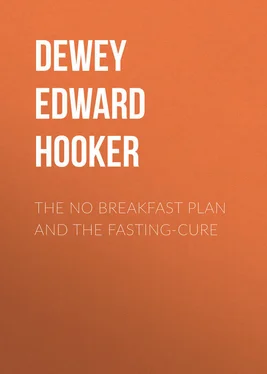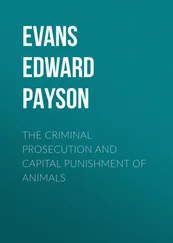Edward Dewey - The No Breakfast Plan and the Fasting-Cure
Здесь есть возможность читать онлайн «Edward Dewey - The No Breakfast Plan and the Fasting-Cure» — ознакомительный отрывок электронной книги совершенно бесплатно, а после прочтения отрывка купить полную версию. В некоторых случаях можно слушать аудио, скачать через торрент в формате fb2 и присутствует краткое содержание. Жанр: foreign_antique, foreign_prose, на английском языке. Описание произведения, (предисловие) а так же отзывы посетителей доступны на портале библиотеки ЛибКат.
- Название:The No Breakfast Plan and the Fasting-Cure
- Автор:
- Жанр:
- Год:неизвестен
- ISBN:нет данных
- Рейтинг книги:3 / 5. Голосов: 1
-
Избранное:Добавить в избранное
- Отзывы:
-
Ваша оценка:
- 60
- 1
- 2
- 3
- 4
- 5
The No Breakfast Plan and the Fasting-Cure: краткое содержание, описание и аннотация
Предлагаем к чтению аннотацию, описание, краткое содержание или предисловие (зависит от того, что написал сам автор книги «The No Breakfast Plan and the Fasting-Cure»). Если вы не нашли необходимую информацию о книге — напишите в комментариях, мы постараемся отыскать её.
The No Breakfast Plan and the Fasting-Cure — читать онлайн ознакомительный отрывок
Ниже представлен текст книги, разбитый по страницам. Система сохранения места последней прочитанной страницы, позволяет с удобством читать онлайн бесплатно книгу «The No Breakfast Plan and the Fasting-Cure», без необходимости каждый раз заново искать на чём Вы остановились. Поставьте закладку, и сможете в любой момент перейти на страницу, на которой закончили чтение.
Интервал:
Закладка:
As to the danger of death from mere starvation, the following remarkable case reveals how remote it is in the ordinary history of acute diseases. The late Rev. Dr. Merchant, of Meadville, Pa., a short time before his death, which occurred some months ago, informed me that a brother entered the army during the War of the Rebellion with a weight of one hundred and fifty-nine pounds. He was sent home so wasted from ulceration of stomach and bowels that he actually spanned his thigh with thumb and finger. He lived ten days only, to astonish all by the clearness of his mind even on the last day of his life, when he could think on abstruse questions as he had never been known to do in health. At death his body weighed only sixty pounds.
It was Dr. Merchant's opinion, from a history of the case, that no food was digested during the last four months of his life; but it is my opinion that it took a much longer time than this for the brain to absorb more than ninety pounds of the body. That life was shortened by the more rapid loss of the tissues from the disease is to be taken into account in estimating time in starvation.
IV
Feeding the sick! Who that rule in kitchens and feed the well do not realize with weariness of brain the demands of the stomach that at each meal there shall be some change in the bill of fare?
The chief reliance of physicians for the maintenance of strength while sick bodies are being cured is milk. As a food, milk was mainly destined for the calf, and not for man – certainly not after the coming of the molars. It is not a food that will start the saliva in case of hunger, as the odors from the frying-pan or from roasting fowl, yet because it plays such an important part as a complete food for some months in the life of the calf, and because it can be taken without especial aversion when the odors of the cooking-stove are an offence to the nostrils; it is given by the hour, day after day, and in some cases week after week; and there are physicians by the thousands who reinforce this inflexible bill of fare by the strongest alcoholics, whiskey being generally selected.
In this connection I shall say of alcoholics that they contain not an atom that can be converted into living atoms; they congest and irritate the stomach, and hence lessen digestive power; and benumb all the brain powers and faculties.
As a daily ration without change, this combination, strictly adhered to, would prostrate the energies of a giant, and he would find himself mustered out of all active service in less time than the hapless sick are often compelled to endure such feeding. Does Nature so conveniently reverse herself to meet an emergency that the sick can be built up and sustained by such feeding as would debilitate the well?
In the city where I live the physicians average well in learning, ability, character, and experience. Among them are the extremists in dosage: those with a hundred remedies for a hundred symptoms; others with such boluses as would writhe the face of an ox. There are some with extraordinary force of command in the rooms of the sick, who believe that whiskey is nourishing and that milk is liquid food; that doses go into human stomachs to travel the rounds of the circulation, and finally drop off at the right place for either patchwork or original work.
Whatever there is in drugs to cure disease, whatever in milk and the strongest alcoholics to sustain the strength, every protracted case has been made to reveal in their forceful hands. I have no reason to believe they exceeded authorized treatments. I have no reason to doubt that in all countries, in all lands, where there are educated physicians, the same appliances are in common use, appliances that will make the next short step from the lancet and bolus of a darker age the estimate of the time to come.
The treatments of the sick are always changing, while the process of cure remains the same. Only in the case of broken bones are we compelled to let Nature do all the curing, while we may take pride in some progress in the mechanical appliances.
As milk and stimulants are a common, authorized means to sustain the sick, and as they are poured into human stomachs with all the faith with which lancets were once forced into congested veins, their efficiency for good or evil must be studied by comparison.
Treatments must lessen both the severity and the duration of disease to be of permanent benefit. For a study by comparison, this opportunity came to me. There was a call to attend a case of typhoid fever in a young girl. In the same vicinity there had been under the care of one of my forceful brethren a woman in middle life, whose stomach was habitually rejecting all the milk and alcoholics poured into it, the doctor having a theory that good would result no matter how brief the time they were retained.
For a month my patient swallowed only the desired water and doses which did not corrode, a desire for food coming at the end of the month. The only day and night nurse was an overwrought mother, who got into bed with the same disease as soon as the daughter got out of it. There was another month of severer sickness, when without food and without the horror of dosage, as before, the call for food marked the close of the disease. My services ended here some days before the undertaker took charge of the doctor's case.
A girl in her later teens, with a mild, so-called malarial fever, fell into the same forceful care. There was a true history in this case of nearly two gallons of whiskey, and daily milk from the quart at first down to inability to take the least nourishment at last. Then there were more than a month of days when vital power sustained itself without the ways of violence, death occurring during the nineteenth week .
The ravenous brain had absorbed the lips to such thinness that the depressions between the teeth were clearly revealed. From the first dose to the last breath this was a case of dying, and the most persistent fight for life against immense odds I have ever become aware of in an acute case. In this case the stomach had become so seared by the alcoholic that digestion was impossible, as would have been the case in a body that was not sick.
Near this home there was a more delicate girl of about the same age taken with the same fever; but with mild dosage and no food – in Nature's care – hunger came at the close of the fourth week.
Later on in the same family there was a case of la grippe, in which for several years there had been chronic, ulcerative bronchitis that bid defiance to blisters and inhalations, the various specifics of another forceful predecessor, who also was a believer in large doses and full rations of alcoholized milk.
The coughing was so persistent, so continuous, that only the hypodermic needle met the need. To prevent the tearing of a raw surface in the bronchial tubes by the cough was as necessary as to apply splints to a broken bone. There was no food for six weeks, and Nature made most of her opportunity, not only to cure the acute disease, but also the chronic disease, which for nearly ten years since has remained cured.
I was summoned to Asheville, N. C., to see a young man in the last stage of consumption. I found him nearly a skeleton, though he had been eating six times daily for several months by the decree of a really learned physician. The belchings from gas were loud and frequent; the sputa by actual measure was about six ounces during every twenty-four hours.
A fast was ordered, and on the third day a mass of undigested food was thrown up. As soon as the stomach and bowels became empty there was comfort all along the line, and the cough was so diminished, that less than an ounce of sputa was raised in twenty-four hours.
After a week of fasting there came a natural desire for food, and thence on he enjoyed without distress of stomach all he wished to take. Thence on he lived with only the least discomfort, and with whispering lips he dictated to me his will, conveying large property. He could look with meaning when the power to whisper was gone, and life ended as the going out of a candle.
Читать дальшеИнтервал:
Закладка:
Похожие книги на «The No Breakfast Plan and the Fasting-Cure»
Представляем Вашему вниманию похожие книги на «The No Breakfast Plan and the Fasting-Cure» списком для выбора. Мы отобрали схожую по названию и смыслу литературу в надежде предоставить читателям больше вариантов отыскать новые, интересные, ещё непрочитанные произведения.
Обсуждение, отзывы о книге «The No Breakfast Plan and the Fasting-Cure» и просто собственные мнения читателей. Оставьте ваши комментарии, напишите, что Вы думаете о произведении, его смысле или главных героях. Укажите что конкретно понравилось, а что нет, и почему Вы так считаете.












